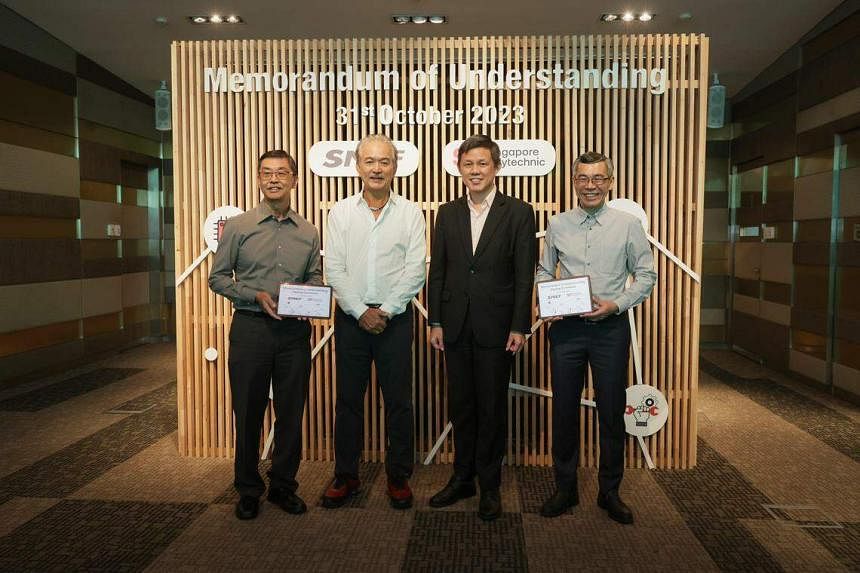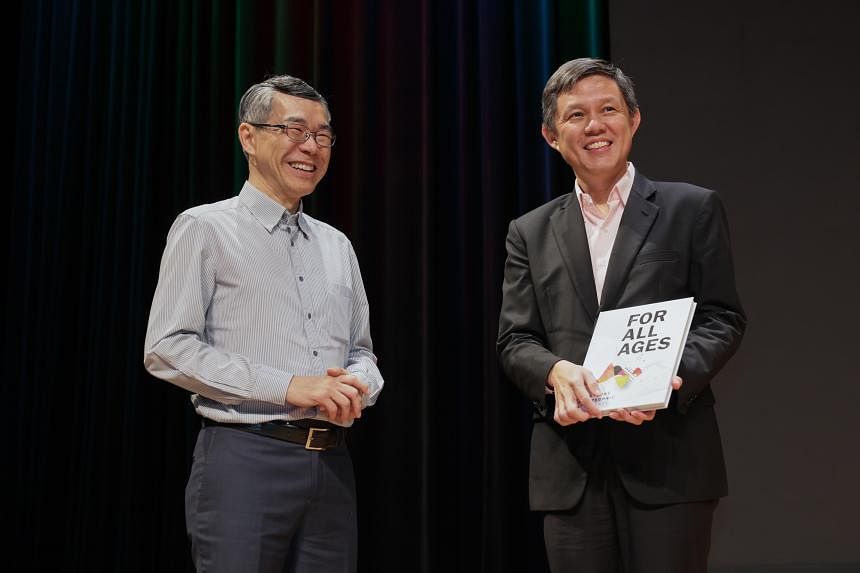SINGAPORE – In just five years, Singapore Polytechnic (SP) tripled the number of lecturers teaching adult learners, as the country’s first polytechnic expanded its mission to train not just younger school-leavers before they hit the workforce, but working adults looking to reskill as well.
By 2021, 73 per cent of SP’s lecturers conducted lessons for adult learners – up from 25 per cent in 2016.
The polytechnic also more than doubled the number of hours spent in training by all continuing education and training (CET) participants to 2.13 million in 2021.
These trends are highlighted in a book, For All Ages, Singapore Polytechnic At Seventy, which commemorates the polytechnic’s upcoming 70th anniversary in 2024.
The book, launched at a ceremony on Tuesday at SP’s Dover campus, reflects on its journey and role in shaping polytechnic education here, alongside the four other polytechnics – Nanyang, Ngee Ann, Republic and Temasek.
Education Minister Chan Chun Sing was the guest of honour at the event, which was held to recognise the contributions of staff across polytechnics and the Institute of Technical Education.
SP principal Soh Wai Wah said it has been “a major transformation” as higher learning institutions shifted towards serving working adults in the past decade, from catering mainly to fresh school-leavers initially.
“Previously, the mission was to focus only on the pre-employment training to prepare students before they take their first job,” he said.
“But now, the Singapore adult workforce needs to be reskilled for the digital revolution. So, SP has to expand our mission – and now, we make training of adults also part of our core roles.”
This means understanding how adults learn differently and making CET programmes more “bite-sized”, to fit their needs and schedules, said Mr Soh.
“We have to go into things like microcredentials, where each of these bite-sized modules earn recognition from the industry for the skills that they impart,” he said, adding that these microcredentials should then be stackable towards “a higher level of recognition”.
“In this way, we provide a road map that allows different adults to acquire job-relevant skills at their own pace based on their own means.”
He also expects to see more working adults return to the polytechnic sector, with the Government indicating in its recent Forward Singapore report unveiled on Oct 27 that Singaporeans who already hold a publicly funded diploma or higher qualification will get help with obtaining another subsidised diploma.
“I’ve been telling my students that the job that they train for today may not exist 10 years from now… The job that they (may) do 10 years from now may not even exist today,” said Mr Soh.
“It’s important that the adult workforce reskill themselves. This could be deepening existing skills or having to enter a totally new field.”
To meet the needs of adult learners, SP – which was set up in 1954 – has also changed the way it delivers lessons.
To give learners more flexibility, the polytechnic will up the proportion of curriculum for CET courses placed online, from the current 30 per cent to as high as 70 per cent for courses such as two specialist diplomas launched in October, Mr Soh said. The two courses are full-stack Web development and computing architecture.
For younger pre-employment students, SP piloted “flipped learning” in 2015, where students watch pre-recorded lectures on their own time before meeting up for face-to-face tutorials.
The approach was fully implemented in the academic year 2022, after the polytechnic was convinced that it had benefits for students.
Surveys by SP have indicated that students have developed a greater sense of self-directedness, which means they are more proactive and independent, Mr Soh said.
At the same time, students “continue to successfully complete their diplomas, and there’s no change in the failure rates”, he added.
“In fact, flipped learning now allows us to better identify weaker students, so we can deploy more resources to attend to them. And so we can expect that in the long term, the exam performance of weaker students can also improve.”

On Tuesday, SP also signed a memorandum of understanding with the Singapore National Employers Federation, to connect polytechnic and ITE students with potential employers across 16 sectors, such as manufacturing and maritime.
This will see a new centre set up at SP from 2024 to hold exhibitions and workshops that will be open to students from other institutions as well as mid-career switchers, said Mr Toh Ser Khoon, SP’s director for industry and partnerships.
This will give students access to more jobs and internships, and employers will find it easier to recruit talent, he added.


